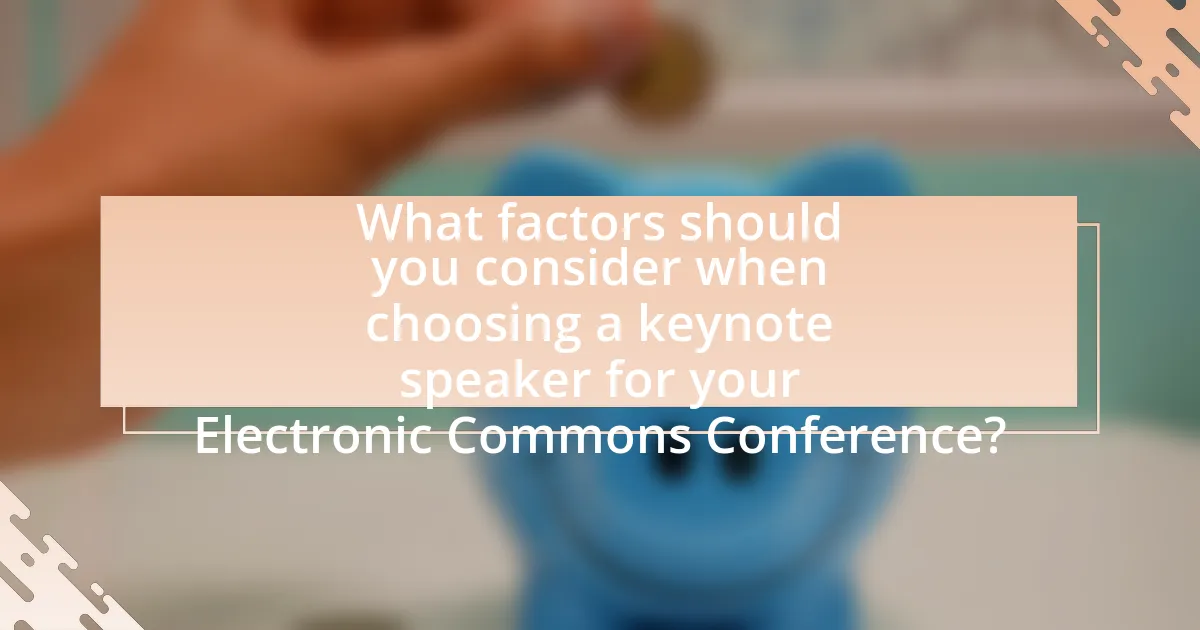Choosing the right keynote speaker for your Electronic Commons Conference is crucial for ensuring a successful event. Key factors to consider include the speaker’s expertise in electronic commons, their speaking experience, and their ability to engage the audience. Evaluating their background, presentation style, and reputation can help assess their relevance to the conference theme and audience needs. Additionally, effective communication and clear expectations between the organizer and the speaker are essential for maximizing the impact of the presentation. This article outlines best practices for selecting and engaging keynote speakers, providing insights into evaluating candidates and enhancing their influence during and after the conference.

What factors should you consider when choosing a keynote speaker for your Electronic Commons Conference?
When choosing a keynote speaker for your Electronic Commons Conference, consider their expertise in electronic commons and related fields. A speaker with a strong background in technology, digital rights, or open access can provide valuable insights relevant to the conference theme. Additionally, evaluate their speaking experience and ability to engage an audience, as effective communication is crucial for impactful presentations. Research their previous speaking engagements and audience feedback to ensure they resonate well with attendees. Finally, assess their availability and willingness to tailor their presentation to align with your conference goals, ensuring a cohesive experience for participants.
How does the speaker’s expertise align with the conference theme?
The speaker’s expertise aligns with the conference theme by directly addressing the intersection of technology and community engagement in electronic commons. The speaker has a proven track record in digital collaboration, evidenced by their previous work on projects that enhanced online community participation, which is a core focus of the conference. Their published research on the impact of digital tools in fostering inclusive environments further supports their relevance to the theme, demonstrating a deep understanding of how technology can facilitate community building in electronic spaces.
What specific knowledge or experience should the speaker possess?
The speaker should possess extensive knowledge in electronic commons, including familiarity with digital collaboration tools, open access principles, and data sharing practices. This expertise is essential for effectively addressing the audience’s interests and challenges in the field. Additionally, the speaker should have practical experience in implementing electronic commons initiatives, demonstrated through previous projects or roles that involved community engagement and technology integration. Such qualifications ensure that the speaker can provide valuable insights and actionable strategies relevant to the conference theme.
How can you assess the relevance of their background to your audience?
To assess the relevance of a speaker’s background to your audience, analyze their expertise, experience, and previous speaking engagements in relation to the audience’s interests and needs. For instance, if your audience consists of professionals in technology, a speaker with a strong background in tech innovations and relevant industry experience will likely resonate more effectively. Research shows that audience engagement increases when speakers share relatable experiences and knowledge, as highlighted in studies by the National Speakers Association, which indicate that relevance significantly impacts audience retention and satisfaction.
What is the importance of the speaker’s presentation style?
The speaker’s presentation style is crucial as it directly influences audience engagement and retention of information. A dynamic and well-structured presentation style can captivate listeners, making complex topics more accessible and memorable. Research indicates that effective presentation styles, which include clear articulation, appropriate pacing, and engaging visuals, can enhance understanding by up to 50% (Mayer, 2009, “Multimedia Learning”). This demonstrates that the way a speaker delivers content significantly impacts the audience’s ability to absorb and retain the information presented.
How does the speaker’s delivery impact audience engagement?
The speaker’s delivery significantly impacts audience engagement by influencing attention, retention, and emotional connection. Effective delivery techniques, such as vocal variety, body language, and pacing, can captivate the audience, making them more likely to absorb the content. Research indicates that speakers who utilize dynamic delivery styles can increase audience retention rates by up to 50%, as noted in a study published in the Journal of Educational Psychology. This demonstrates that a well-executed delivery not only holds the audience’s attention but also enhances their overall experience and understanding of the material presented.
What are the characteristics of an effective keynote presentation?
An effective keynote presentation is characterized by clarity, engagement, and relevance. Clarity ensures that the message is easily understood, often achieved through a well-structured narrative and concise language. Engagement involves capturing the audience’s attention through storytelling, visuals, and interactive elements, which can enhance retention and interest. Relevance means the content directly addresses the audience’s needs and interests, often supported by current data or trends that resonate with the attendees. For instance, a study by the National Speakers Association found that presentations incorporating storytelling and audience interaction significantly improve audience retention rates, highlighting the importance of these characteristics in effective keynote presentations.
Why is it essential to consider the speaker’s reputation?
Considering the speaker’s reputation is essential because it directly influences the audience’s perception and trust in the message being delivered. A speaker with a strong reputation is often seen as credible and knowledgeable, which enhances the overall impact of the presentation. Research indicates that audiences are more likely to engage with and accept information from speakers who are recognized as experts in their field, as evidenced by a study published in the Journal of Communication, which found that perceived credibility significantly affects audience persuasion. Therefore, selecting a speaker with a solid reputation can lead to a more successful and impactful conference experience.
How can you evaluate a speaker’s past performance and credibility?
To evaluate a speaker’s past performance and credibility, review their previous speaking engagements, audience feedback, and professional qualifications. Analyzing recorded speeches or testimonials can provide insights into their effectiveness and engagement level. For instance, a speaker with a history of successful presentations at reputable conferences, supported by positive audience ratings, demonstrates credibility. Additionally, checking their educational background and industry experience can further validate their expertise.
What role does audience feedback play in assessing a speaker’s reputation?
Audience feedback is crucial in assessing a speaker’s reputation as it provides direct insights into the audience’s perception of the speaker’s effectiveness and credibility. Positive feedback, such as high ratings and favorable comments, can enhance a speaker’s reputation, indicating that they successfully engaged and informed their audience. Conversely, negative feedback can damage a speaker’s reputation, suggesting a lack of connection or expertise. Research shows that 70% of event organizers consider audience feedback as a primary factor in evaluating speakers, highlighting its significance in reputation assessment.

How can you effectively evaluate potential keynote speakers?
To effectively evaluate potential keynote speakers, assess their expertise, presentation skills, and audience engagement. Start by reviewing their credentials and experience in the relevant field to ensure they possess the necessary knowledge. Analyze video recordings of their past speeches to gauge their delivery style and ability to connect with an audience. Additionally, seek feedback from previous event organizers or attendees to understand their impact and effectiveness. Research shows that speakers with a strong track record of engaging audiences tend to leave a lasting impression, which is crucial for a successful conference.
What resources can you use to find potential speakers?
To find potential speakers for your Electronic Commons Conference, utilize professional networking platforms such as LinkedIn, speaker bureaus, and industry-specific conferences. LinkedIn allows you to search for experts in relevant fields, while speaker bureaus provide curated lists of speakers with proven expertise. Additionally, attending industry conferences can help identify speakers who are actively engaging with audiences and presenting on pertinent topics. These resources are effective because they connect you with individuals who have established credibility and experience in their respective domains.
Which platforms or networks are best for discovering keynote speakers?
The best platforms for discovering keynote speakers include SpeakerHub, LinkedIn, and GigSalad. SpeakerHub offers a dedicated space for speakers to showcase their profiles and expertise, making it easier for event organizers to find suitable candidates. LinkedIn provides a vast professional network where users can search for speakers based on industry, experience, and recommendations. GigSalad allows event planners to browse and book speakers directly, featuring reviews and ratings to aid in decision-making. These platforms are widely recognized for their effectiveness in connecting event organizers with qualified keynote speakers.
How can industry recommendations assist in your search?
Industry recommendations can significantly enhance your search for a keynote speaker by providing insights into reputable individuals who have successfully engaged audiences in similar contexts. These recommendations often come from trusted sources within the industry, such as previous conference organizers or professional associations, which can help you identify speakers with proven track records. For instance, a study by the International Association of Speakers Bureaus found that 70% of event planners rely on peer recommendations to select speakers, underscoring the value of industry insights in making informed decisions.
What criteria should you use to shortlist candidates?
To shortlist candidates for a keynote speaker at your Electronic Commons Conference, prioritize expertise in the relevant field, proven public speaking skills, and alignment with the conference theme. Expertise ensures the speaker possesses in-depth knowledge and credibility, which is essential for engaging the audience effectively. Proven public speaking skills can be assessed through past speaking engagements, audience feedback, and video recordings, demonstrating their ability to communicate ideas clearly and compellingly. Alignment with the conference theme guarantees that the speaker’s message resonates with the audience’s interests and the event’s objectives, enhancing the overall experience.
How do you weigh experience against cost when selecting a speaker?
When selecting a speaker, weigh experience against cost by evaluating the speaker’s track record and relevance to your audience in relation to their fee. Experienced speakers often command higher fees due to their proven ability to engage and deliver valuable insights, which can enhance the overall impact of your conference. For instance, a speaker with extensive industry experience may charge $10,000, while a less experienced speaker might charge $3,000. However, if the experienced speaker can attract more attendees or generate higher engagement, the additional cost may be justified. Therefore, assess the potential return on investment by considering factors such as audience size, engagement levels, and the speaker’s ability to address key topics relevant to your conference.
What questions should you ask during the selection process?
During the selection process for a keynote speaker at an Electronic Commons Conference, you should ask questions that assess the speaker’s expertise, relevance, and engagement skills. Key questions include:
- What is your experience with topics related to electronic commons and how have you engaged audiences in the past?
- Can you provide examples of previous speaking engagements and the feedback received?
- How do you tailor your presentations to meet the specific needs of diverse audiences?
- What innovative ideas or insights can you bring to our conference theme?
- Are you familiar with current trends and challenges in the field of electronic commons?
These questions help ensure that the selected speaker aligns with the conference objectives and can effectively connect with attendees.

What are the best practices for engaging with your chosen keynote speaker?
The best practices for engaging with your chosen keynote speaker include clear communication, setting expectations, and providing necessary resources. Clear communication ensures that both the organizer and the speaker understand the event’s goals, audience, and logistics. Setting expectations involves discussing the speaker’s role, the desired outcomes of their presentation, and any specific topics to cover. Providing necessary resources, such as background information about the audience and event context, enables the speaker to tailor their message effectively. These practices enhance the overall experience and ensure alignment between the speaker’s delivery and the event’s objectives.
How can you ensure clear communication with the speaker?
To ensure clear communication with the speaker, establish a structured communication plan that includes regular check-ins and clear expectations. This approach allows both parties to align on objectives, content, and logistics, minimizing misunderstandings. Research indicates that effective communication strategies, such as setting specific agendas and utilizing collaborative tools, enhance clarity and engagement in professional settings. For instance, a study published in the Journal of Business Communication highlights that structured communication significantly improves speaker-audience interactions, leading to more successful presentations.
What information should you provide to the speaker before the event?
You should provide the speaker with details about the event’s theme, audience demographics, schedule, and logistical information. The event’s theme helps the speaker tailor their content to align with the overall message, while understanding the audience demographics allows for appropriate language and examples. Sharing the schedule ensures the speaker is aware of their time slot and any other speakers or sessions they may need to coordinate with. Additionally, logistical information such as venue details, technical requirements, and contact persons for the event facilitates a smooth presentation. These elements are essential for the speaker to prepare effectively and deliver a relevant and engaging presentation.
How can you establish expectations regarding the presentation?
To establish expectations regarding the presentation, clearly communicate the objectives, format, and desired outcomes to the keynote speaker. This involves outlining the key topics to be covered, the time allocated for each segment, and the audience’s level of expertise. Providing this information ensures that the speaker can tailor their content effectively. Research indicates that clear communication of expectations enhances speaker performance and audience satisfaction, as evidenced by a study published in the Journal of Business Communication, which found that 75% of effective presentations stem from well-defined objectives and audience understanding.
What strategies can enhance the speaker’s impact at your conference?
To enhance the speaker’s impact at your conference, utilize engaging storytelling techniques. Engaging storytelling captivates the audience’s attention and fosters emotional connections, making the content more memorable. Research indicates that narratives can improve information retention by up to 65%, as they create relatable contexts for complex ideas. Additionally, incorporating interactive elements, such as Q&A sessions or live polls, encourages audience participation, further solidifying the speaker’s message and enhancing overall engagement.
How can you integrate the speaker’s message into the overall conference agenda?
Integrating the speaker’s message into the overall conference agenda involves aligning the speaker’s key themes with the conference’s objectives and session topics. This can be achieved by reviewing the speaker’s content in advance and identifying core messages that resonate with the audience’s interests and the conference’s goals. For instance, if the speaker emphasizes innovation in electronic commons, sessions can be structured around case studies or workshops that explore innovative practices in the field. Additionally, incorporating the speaker’s insights into promotional materials and session descriptions can enhance coherence and engagement. This approach ensures that the speaker’s message is not only highlighted but also woven into the fabric of the conference, creating a unified experience for attendees.
What follow-up actions can you take to maximize the speaker’s influence post-conference?
To maximize the speaker’s influence post-conference, engage the audience through targeted follow-up communications. This can include sending personalized thank-you emails to attendees, sharing key takeaways from the speaker’s presentation, and providing access to recorded sessions or supplementary materials. Research indicates that follow-up engagement can enhance retention of information by up to 60%, reinforcing the speaker’s message and maintaining audience interest. Additionally, leveraging social media to highlight the speaker’s insights and encouraging attendees to share their experiences can further amplify the speaker’s reach and impact.
What tips can help you choose the right keynote speaker for your Electronic Commons Conference?
To choose the right keynote speaker for your Electronic Commons Conference, prioritize speakers with expertise in electronic commons and related fields. Evaluate their previous speaking engagements, ensuring they have a track record of engaging audiences effectively. Additionally, consider their ability to address current trends and challenges in electronic commons, as relevance enhances audience connection. Research their credentials and gather feedback from past events to confirm their impact and effectiveness. This approach ensures that the selected speaker aligns with the conference’s goals and resonates with attendees.